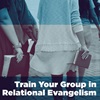The Emerging Church movement is a new expression of the ancient roots of our Christian faith, and community is the master key to its desire to sense and share the Lord in 'non-traditional' ways. It consists of believers who are endeavoring to understand the postmodern worldview, critique it through a biblical lens, and harness it in order to articulate the story of Jesus Christ in ways that can touch the soul of emerging generations.
Every generation has required innovation in how the Church communicates what it has been commissioned to share. Today's "emerging" generation is no different. Small groups are instrumental in helping emerging generations sense the story of Jesus Christ in Christian community so they can see Him at work within their own lives. They demonstrate that the life-giving community of the Church can satisfy their hunger to experience their faith in God, in relationships, and in the world.
The Emerging Church has grown out of a mindset that desires to find new ways of engaging our postmodern culture with the timeless and powerful message of the Gospel like the Apostle Paul did for his time and audience (Acts 17:22-31).[i] With that same intent, I will describe ten characteristics of the kind of community that attunes the hearts of emerging generations to the Good News. Additionally, I will suggest ways small group leaders can build upon each characteristic in their group life.
1) Relational — The Emerging Church sees the spiritual life as a journey that involves others who have an important role to play in one's spiritual shaping and success. There continues to be a growing desire to prioritize relationships in our culture, despite the counter-relational offspring created by the bedfellows of consumerism and individualism. Overall, relationships carry a greater weight in one's life choices for emerging generations, and this translates to their spiritual lives as well.
Small group leaders can build on this characteristic by letting their group's structure and study focus flow out of the relationships of people in the group. For example, a group leader can construct their group life on the foundation of factors that create affinity like similar age, season, or situation in life, or a shared interest, whether it is recreational or intellectual in nature. Once people are gathered, leaders can learn who their group participants are and help them to learn about each other. It is well worth the time at the beginning of a group's season or study together to ask questions like: "What interested you about this group?", "What do you hope to experience and walk away with as a result of being part of this group?" People will have a richer experience of community in their small group if their leader is operating out of a keen awareness of the group's relational dynamic.
2) Unbounded—The community of the Emerging Church is fluid. It is not limited to larger weekend services or smaller group meetings. It is the combination of the two, interwoven and creatively expressed together that provides true impetus for faithful living. It is something believers belong to, but it is also something they bring others to. God's people also bring this new community to emerging generations and blend it together with the communities and social networks of which they are already a part. In other words, the Emerging Church does not want to replace the community of emerging generations; it would rather reclaim unreached communities for Christ by infiltrating them with the community of the Spirit. Emerging believers seek to engage the world as opposed to retreating from it. For them, the Church is an outlet versus an enclave—a source of spiritual power for believers to be the full-wattage light God has called them to be. The small group gatherings of the Emerging Church are less about meeting agendas and more about regrouping throughout the spiritual journey. They help to bridge the perceived gap between the attractional and incarnational models of mission, just as they did for the Early Church (Acts 2:46-47, 5:42).
Small group leaders can build on this characteristic by encouraging unfettered relationship building. For example, connection can happen spontaneously between group meetings. Leaders can call on or meet up with group participants outside of scheduled meeting times just to catch up or to help tackle a personal need. They can show others in the group how it is a good thing when the community of their small group overflows to everyday life. The people of my small group have helped each other move. They meet together for coffee during the week.They introduce one another to acquaintances in the public realm, and they serve together on ministry teams during our weekend services. The point is that when the community of a small group is free-flowing it is more likely to flow over to the unreached.
3) Alive — People want to experience the life of God. This is especially true for emerging generations. The life of God expressed through the Church is its own kind of evangelism. The aspects or activities involved in emerging community are pursued out of a desire for vibrant relationship with God and others. Tradition is respected, but if it becomes lifeless routine or ritual for emerging believers, they will gladly replace it with whatever awakens their souls and enlivens their spirits. If "seeing is believing" was true for earlier generations, then "sensing is believing" is for emerging generations.
Small group leaders can build on this characteristic by making different aspects of group life multi-sensory. There are some group leaders in the church where I serve who have brought food that is common to the region they are studying in the Bible and shared it during their time of fellowship, e.g. Turkish coffee, dates, and other Middle Eastern treats. Group leaders have shared pictures or objects during the Bible study that represent the theme or topic of what they are learning together, e.g. an oil lamp or coins from the first century. Others have used small group worship DVDs that have images of creation blended in with the music. Taking communion, serving those in need, quiet reflection, etc.—there are countless ways the five senses can be stimulated during the outworking of all the aspects or purposes of a group's life together.
4) Natural —The word "organic" for community will phase out of usage in the same way "contemporary" has for music. The Emerging Church wants to create community that is natural for what it is versus being a "correction" to previous expressions. "Emerging believers" want to bring life to faith and faith to life in ways that are natural for them and those in their relational circles. Small groups are not so much the ultimate form of community as much as they are a functional bridge for its development. Faith is learned and developed in all-sized gatherings of the church. As trends continue toward 'alternative faith-based Christian communities', small groups will likely carry greater influence in how emerging generations experience their relationship with God and express it through their relationships with others.[ii]
Small group leaders can build on this characteristic by talking more about what their small group is for rather than what it is against. They can learn about where their group participants spend most of the hours of their week, how they experience their relationship with the Lord in those places, and who it is they associate with on a regular basis.
5) Authentic—Realness is a hallmark characteristic of those who would classify themselves as "emerging" in their thought-life and practice. Authenticity feeds the growth of biblical community. Without it, relationships stall out and the group dynamic becomes a frustrating one that participants eventually abandon in their spiritual journey. Emerging believers realize that people who are free to be themselves are also able to tap into the power that community has to offer in helping people find forgiveness and fulfillment in the Lord Jesus Christ.
Small group leaders can build on this characteristic by being transparent and vulnerable themselves. Leaders who can honestly share their own struggle in response to a question are much more likely to inspire a fruitful spiritual conversation than being somebody who tries to have all the answers. They recognize that sharing personal faith experiences (the good, the bad, and the ugly) in response to biblical truth is a powerful vehicle for life transformation.[iii] Authentic group leaders ooze grace while clinging to the truth in love. They take risks in honesty, listen carefully, lead humbly, love lavishly, and seek to understand differences in opinion and personality with great patience and forgiveness.
6) Inclusive — The community of the Emerging Church is highly participatory. Each person has a place and a purpose as a fellow spiritual traveler. Emerging believers know their spiritual progress necessitates connection with others. They desire to let others into their story, and they desire to enter into the story of others. Furthermore, they realize their spiritual growth hinges on how they prayerfully set out to share the story and experience of their spiritual life with other truth seekers. Small groups will continue to help believers engage in relational and invitational evangelism. The Emerging Church simply recognizes that religious pluralism is the most logical starting point for spiritual conversations in a postmodern culture. Its seeker sensitivity is expressed through its inclusivity without surrendering to moral relativity. Nobody ever has or ever will model this better than Jesus (John 3:16-17, 4:1-42; 1 Timothy 2:4). The thinkers and practitioners of the Emerging Church do the hard work of finding new ways of communicating the Gospel message so it connects meaningfully with today's spiritually empty and lost people.
Small group leaders can build on this characteristic by encouraging participants to find a way to use their gifts to enhance the community life of the group and to invite their friends. For example, they can start with a list of easy, task-oriented, "small" roles that someone can volunteer to do for just one season of the group. At the end of this first season, people can evaluate whether they want to continue. Leaders can explain that evangelism is a relational process that everyone can enter into naturally, and then they can take some time with their group to learn about how each person feels most comfortable sharing their faith.[iv] They can help their group participants see that by sharing their experience of God, they are preparing the way for lost people to receive the Gospel.
7) Integrative — Emerging community helps people integrate their heart, soul, mind, and body. It encourages faith to be lived out in all areas of life privately and publicly. Compartmentalization (not being the same person in all parts of life) will become increasingly repulsive. The emerging mindset recognizes and respects the spiritual dimension in every facet of life so integration is the new litmus test of genuineness. This is fitting for emerging generations who seek a holistic expression of their faith and desire to understand and, as much as possible, harmonize with the holistic Hebraic worldview from which the Scriptures were written.
Small group leaders can build on this characteristic by helping group participants to view their experiences of God through a holistic lens. In the group's study and discussion, for example, the leader can include questions that positively force participants to think holistically like: "How can we worship God with all of our heart, soul, mind, and strength in our jobs and mundane chores around the house each week?" When somebody shares a faith experience, the group leader can inquire as to what that means for the person beyond the experience itself. They can read the Scriptures through a Trinitarian lens, e.g. after reading a passage, talk about the presence and role of each person of the Trinity. Group leaders can help participants see how God's Presence is constantly with them, how the Lord always wants to be with us and hear from us, and how we can converse with Him in our tasks throughout each day.[v] They can instigate conversations about what biblical truth means for different dimensions of personal being (spiritual, psychological, social, physical, etc.) and personal space (community, work, home, intimate, etc.).
8) Introspective—Emerging generations want to discover and appreciate their roots. On this note, it is important not to equate introspection with introversion. The emerging community of the Church is reflective yet restless to engage its faith. Its introspection compels it toward greater integration. Emerging believers thirst for tradition, but not traditionalism. In fact, the introspection of the Emerging Church is partially a response to postmodernity's bent toward deconstructionism.[vi] The intrigue with the ancient comes more out of a desire to understand why we do what we do in the Church and to explore new expressions that continue to honor our God-given inheritance.
Small group leaders can build on this characteristic by sharing (or appointing somebody in the group to share) the cultural-historical background of biblical passages being studied. They can explore the words of the Early Christian Fathers, the liturgy of various Christian traditions, and the basis of practices or tradition in their own church.[vii] Group leaders can discuss what is at the heart of why we, as Christ-followers, do what we do and the creative ways tradition can be carried on through the small group's community life.
9) Identificational—Solidarity is a core value to the missional mindset of emerging Christ-followers.[viii] Conformity to Christ entails solidarity with the suffering of the world and shouldering its burdens. This kind of identification is the trademark of the ministry of reconciliation (2 Corinthians 5:17-21).[ix] Emerging believers value solitude but also desire to experience solidarity with humanity's suffering. Evangelization demands internalization for the Emerging Church, which is one reason why Frost & Hirsch's conversation about the 'missional-incarnational church' has struck a cord with so many Christians today. One concept they discuss that matches with this characteristic is "interpathy" which they describe as "that depth of relationship when an outsider to a particular host community develops a burden in her heart for that community. It refers to the capacity for an outsider to pick up a community's sense of values, what has hurt them and where they're headed as a people group. It's a form of identification so deep that the guest / missionary has almost become one of the host tribe."[x] Emerging believers not only recognize the need for this 'expansion of empathy,'they crave it. They want to enter the experience of the other so much so that they see things from their worldview. They want to identify with others the way God identified with us in His Son, Jesus Christ, for in so doing they intuitively know that they will experience a deeper appreciation of the Incarnation. The community of the Emerging Church does not want outreach that is sterile or synthetic. Meaningfulness for them comes through the experience of identification and the relationships forged from the messy business of participating in the world's pangs. The trust that is built through genuine humility and identifying with humanity's common brokenness is what makes the new community of the Church attractive to emerging generations.
Small group leaders can begin to build on this characteristic by turning the group's attention outward during times of prayer. By doing so, they can help group participants cultivate their heart for lost people. The leader can initiate an ongoing conversation about how the group can share its community life with those who have yet to begin a relationship with Jesus Christ. Most evangelistic strategy focuses on the "what" and the "how" of reaching out, while the missional mindset of emerging believers emphasizes reaching in by deepening their influence on the people with whom they have (or with whom they envision themselves having) relationship. Therefore, small group leaders can take time with the fundamentals before planning an outreach initiative by asking questions like: "What social networks are you already a part of?", "Who do you have a heart for that does not yet know Christ?", "How can you take your next steps in fostering these friendships toward Christ?", and "When you imagine yourself sharing the Good News with the people in your circles of influence, what style, model, or picture feels most natural for you?"
10) Influential—The community of an emerging small group wants to go beyond short-term engagement and short-lived impact and have a lasting influence in their community and the people in need beyond their community. They want to be influential and leave a spiritual legacy. The marrow of their mission is relationships, which forms the ground, content, and goal of emerging missionaries. Emerging community aims for holistic transformation. It wants the Gospel to change hearts as well as socio-economic maladies. Emerging believers envision salvation as having a perpetual, transforming influence that starts with the personal life change and extends to matters of public policy, justice, health care, education, etc.
Small group leaders can build on this characteristic by discovering what pulls at the heartstrings of the people in their group. They can ask themselves and the group, "What issues of moral consequence are stirring up political debates or spiritual conversations in our society today?" A leader can propose the idea of their group adopting a local or global concern in the Name of Jesus. Saddleback Church is developing a worldwide church-to-church missional initiative that will be accomplished mainly through small groups called The P.E.A.C.E. Plan. You can check out what some small groups are already doing locally and globally for ideas: www.saddlebackfamily.com/peace. Group leaders can select a medium through which they can stay in touch with current issues (e.g. www.worldmag.com or www.sojo.net) and pray for them on a regular basis. A small group can dialogue about how it can be a transforming agent in response to a world concern like the HIV / AIDS pandemic or the genocide in Darfur. If you are a small group leader, ask your group the question: "What does Micah 6:8 mean for us? How does it play out practically for us?"
The Church will connect with the spiritual longing of emerging generations as it builds the kind of community that reflects these ten characteristics. Small groups alone cannot realize all of these characteristics. However, the sensational community that is created when all ten are brought together is not possible without them.
Small group leaders can ride the wave of the emerging movement by building on these characteristics. They can help emerging generations experience everything Jesus communicated two millennia ago which stimulated the five senses of His generation and reached people in ways the established religious institution could not.
Sensational community is how the Church can engage the emerging matrix without compromising the message it is called to bring and the community it is called to build. Through it all, small groups will continue to play an indispensable role in shaping the Church so that emerging generations can merge into God's family in a manner not unlike that of the Early Church (Acts 2:46-47).
[i] In his book, The Emerging Church (Zondervan: 2003), Dan Kimball communicates how he believes this new movement is more of a mindset than a model and how there are countless examples of emerging churches in existence today. I think he is right, and these assumptions are helpful to keep in mind for this discussion about small groups and the yearning of the Emerging Church to reach new generations with the Good News of Jesus Christ. Incidentally, there is a third and final assumption Kimball clarifies that I hope is true for the Emerging Church: Success is measured missionally by the Holy Spirit producing kingdom-minded disciples of Jesus. That indeed is a picture of success and it ought to be the measurement, but I am doubtful it is for all churches that identify with this new movement. Not all elements or expressions of the emerging mindset are counter-biblical. Most challenges from the emerging tribe are focused on methodology versus the message itself. Challenges to traditional methods should not be misconstrued as a confrontation to the Church's message or in opposition to its essential mission (Matthew 28:19-20).
[ii] George Barna expects that the percentage of Americans who experience and express their faith primarily through 'alternative faith-based communities', like house churches, will increase from 5% (2000) to 30-35% by 2025 (Revolution, Tyndale: 2005, p. 49). For more information on this trend see: www.barna.org/FlexPage.aspx?Page=BarnaUpdate&BarnaUpdateID=241.
[iii] "Postmodern people don't want to be preached at so much as encouraged. Whereas teachers impart information, facilitators create opportunities for learning. They understand the importance of experience-based learning."—Making Sense of Church, Spencer Burke & Colleen Pepper (emergentYS: 2003, p. 54)
[iv] A helpful approach for doing this may be found in Bill Hybels and Mark Mittelberg's presentation of "Evangelism Styles" in their book, Becoming A Contagious Christian (Zondervan: 1996).
[v] "There is not in the world a kind of life more sweet and delightful, than that of a continual conversation with God."—Brother Lawrence
[vi] Deconstructionism is a philosophy that is popular in postmodern thought (and largely presumed) and sadly leads to baseless relativism because it attempts to unpack the cultural assumptions and ideological biases embedded in language, history, philosophy, "religious truths," etc.
[vii] For example, see www.earlychristianwritings.com and www.renovare.org
[viii] "Solidarity with the world means full commitment to it, unreserved participation in its situation, in the promise given it by creation, in its responsibility for the arrogance, sloth and falsehood which reign within it, in its suffering under the resultant distress, but primarily and supremely in the free grace of God demonstrated and addressed to it in Jesus Christ, and therefore in its hope…The community which knows the world is necessarily the community which is committed to it."—Karl Barth, The Community for the World
[ix] "The Church cannot be in Christ without being in Him as He is proclaimed to men in their need and without being in Him as He encounters us in and behind the existence of every man in his need. Nor can the Church be recognized as His except in that meeting of Christ with Himself in the depth of human misery, where Christ clothed with His gospel meets with Christ clothed with the desperate need and plight of men."—T.F. Torrance, Service in Christ
[x] The Shaping of Things to Come, Michael Frost & Alan Hirsch (Hendrickson: 2003), p. 64.









